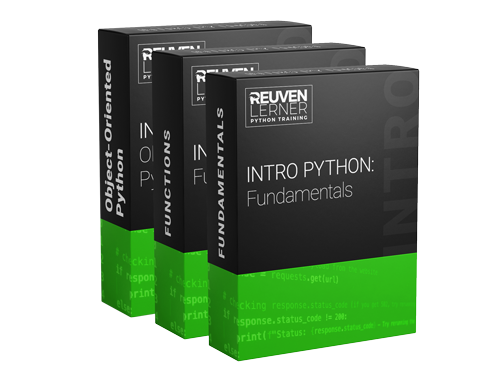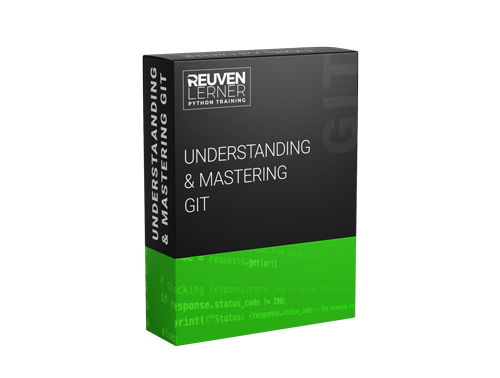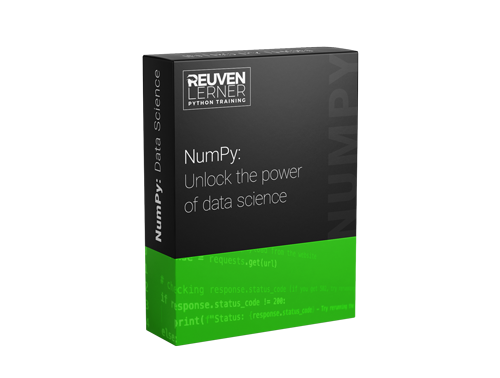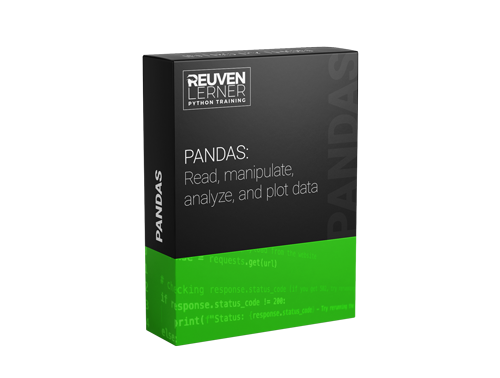Ready to get started?
PYTHON DATA ANALYTICS BOOTCAMP
Program begins: Wednesday, November 8, 2023
18 weeks to a new career in one of the most in-demand areas in the industry
Small Class Size For Maximum Learning
Personal Coaching From Reuven Lerner
Team Collaboration & Messaging
Over $2,000 worth of courses included
LEARN FROM ONE OF THE WORLD'S TOP PYTHON & DATA TEACHERS
Want a new, better career? One that pays well, whose skills are always and in demand, and which will let you work on projects that you care about?
Companies around the world are desperate for people who can analyze data — sales data, testing data, sensor data, accounting data, and even security data. The list is pretty much endless, as is the demand. The programming language that they’re using for their analysis? Python.
I want you to get one of those jobs, boosting your income and increasing your job satisfaction at the same time.
Introducing, my Python Data Analytics Bootcamp (PythonDAB). It’s an intense, online, 18-week program that’ll teach you the skills you need to start your way into the world of Python, Git, NumPy, and Pandas.
This is the biggest, boldest course that I offer. It not only covers the topics that companies told me they’re looking for — it incorporates tons of practice, collaboration, and discussion, all to maximize your learning and understanding. Over four months, you’ll slowly but surely gain fluency in skills that will make you an attractive prospect for any employer.
Plus, you’ll have a lot of fun along the way.
The fourth cohort of PythonDAB will start on Wednesday, November 8th. If you’ve always wanted to move into the world of Python and data, then this course is for you.
WHY THE PROGRAM IS SO EFFECTIVE
1
Powerful exercises designed to expand your skills
It’s easy to sit through a class, nod in agreement as the teacher speaks, and believe that you’ve learned something. But until you’re forced to use what you’ve learned, you don’t know what you really learned — and until you encounter some frustration and resistance, it won’t sink in. That’s why every topic in PythonDAB includes exercises that force you to put what you’ve learned into practice.
The exercises are drawn from my nearly 30 years teaching at some of the world’s biggest and best-known companies. They’ll frustrate you, and push you to your limits — but they’ll also help you to gain fluency and understanding, making it easier to use those techniques when you need them in your day-to-day work.
2
Private coaching From Reuven
Everyone loves the convenience of video courses. But let’s be honest: There’s nothing like an instructor who can, live and in person, answer your questions, review your code, and help you to overcome obstacles.
That’s why every week of PythonDAB includes two hours of private coaching. One weekly meeting is a “collaboration session,” when we work together to answer some of the week’s exercises. A second is devoted to Q&A, when we can review material, exercises, or general questions that you have about the material.
The sessions are live, but they’re also recorded — so if you cannot make a session, or just want to review it, you’ll be able to do so. Moreover, I use Jupyter for all of my coding, meaning that you’ll be able to review, edit, and/or replay anything that I did during the session. And if you cannot make office hours? Just e-mail me your questions in advance, and I’ll read and answer them on the video.
3
Group projects & collaboration
Companies aren’t looking for independent geniuses. They’re looking for people who can work with others, collaborating on projects that are too big or complex for any one person. And if those people know how to collaborate with Git? Then they’re worth even more.
That’s why PythonDAB places a huge emphasis on collaboration. I’ll ask you to comment on other people’s code, first in the forum and then using Git, including pull requests. I’ll ask you to work in groups to solve problems. I’ll ask you to collaboratively solve exercises during office hours.
The more you can learn to read and critique other people’s code, and also accept criticism from others about your code, the readier you’ll be for big-time projects and jobs.
4
Private forum
Have a question that can’t wait for office hours? Or want to share code with others in the group? Or wondering about some new functionality in the latest version of Pandas?
Ask away, in our cohort’s private forum. In addition to using the forum to post questions and collaborate on initial exercises, it’s also there to help you through the weekly exercises. You’ll get support not just from me, but also from others in your cohort, who will have their own insights and ideas.
5
Concrete schedule
If you’re like me (and most people I know), you buy online courses and then never take them. They stick around on your computer, and you feel guilty… but you never get around to taking them.
In PythonDAB, you aren’t on your own: You’re part of a cohort, on a set, weekly schedule. The gentle, constant peer pressure you’ll feel to keep up with the group will ensure that you learn more, making your learning a priority each week.
Previous participants have reported spending 10-15 hours/week on the videos, exercises, and office hours. The more experience you have with programming, and especially programming with Python, the less time you’ll require — but 10 hours are a good minimum expectation.
What if you are swamped with work or family responsibilities? What if you just can’t quite keep up? PythonDAB has two “rest weeks” built into the schedule, meant precisely to help you catch up if you fell behind. I want you to complete the course successfully, and I’ve structured the course to make that possible.
6
For those ready to grow rapidly
I want every bootcamp participant to succeed:
- To keep up with the videos and exercises,
- To participate actively in the forum and office hours,
- To feel like they’re really learning and improving
But PythonDAB is a lot of work, and it isn’t for everyone. I don’t want your money if the course is a bad fit for you. That’s why everyone has to interview for a slot in PythonDAB — and every cohort, there are people I turn away, saying that they aren’t good candidates. (I then suggest what they can do to become better candidates for a future cohort.)
By keeping the cohort small, and limiting participation to the people who I think are best positioned to succeed, we all benefit.
IS THE BOOTCAMP A GOOD FIT FOR YOU?
SMALL COHORTS
PREVIOUS KNOWLEDGE
INVEST IN YOUR CAREER
MAJOR COMPANIES HIRE ME TO TRAIN THEIR DEVELOPERS
I would love to train you as well
IBM
Apple
Western Digital
Cisco
Paypal
Intel
LIFETIME ACCESS TO THE COURSE MATERIAL
We not only be using these courses during the bootcamp, but you will also have lifetime access to each of them included with your bootcamp membership.
Intro Python

The same introduction to Python that I give at companies around the world, including basic data structures, files, functions, comprehensions, and object-oriented programming.
Git

Use Git for version control, and collaboration with others via GitHub. Understand how Git works behind the scenes, and take advantage of that for branching, merging, and correcting errors.
NumPy

Learn how to analyze data with the ease of Python and the efficiency of C: 1- and 2-dimensional arrays, dtypes, extracting data, cleaning data, and basic plotting with Matplotlib.
Pandas

Built on top of NumPy, Pandas provides adds flexibility and built-in functionality. Learn about series, data frames, indexes and multi-indexes, analyzing data, working with text strings, working with dates, and plotting.
PythonDAB cohort 4 (November 2023) schedule
We will begin the course by diving into the fundamentals of Python:
- Basic data types
- Lists, tuples, dicts, and sets
- Comprehensions
- Files
- Functions
During these weeks, we’ll take a break from Python code, and will talk about how we’ll write Python code, and how we’ll collaborate with other people:
- Using an IDE
- Using Git
- Collaborating with GitHub
Following these topics, we’ll have our first “rest week,” giving you a chance to catch up — or to see your family, who might be concerned about your whereabouts by this time.
Now that we’ve seen the basic building blocks of Python’s data structures and functions, we’ll spend two weeks talking about how to build them into larger, reusable structures:
- Modules and packages (using, writing, and installing from the Internet with “pip”)
- Object-oriented Python (classes, instances, methods, attributes, and inheritance)
During this part of the course, we’ll look at the packages that make it easy to analyze data with Python, NumPy and Pandas:
- NumPy arrays
- Pandas series
- Pandas data frames
- Selecting rows and columns
- Cleaning data
- Sorting, merging, and grouping data
At this point, the course will shift to focus 100% on practice problems. We’ll do 2-3 problems per week, and will collaborate on them via the forum, GitHub, and during office hours.
The point of the practice problems is to give you as much real-world experience as possible with reading, cleaning, sorting, grouping, and plotting — and to give you a portfolio of projects you’ve done for any job interviews you’ll land.
IN JUST 18 WEEKS YOU WILL BE ABLE TO...

Solve problems with Python

Understand how Python works, including functions and objects

Use Git on your own projects, and to collaborate

Read and clean data from a variety of real-world sources and formats

Know how to sort, group, and merge Pandas data in a variety of ways

Know how to optimize your Pandas queries for speed and memory
PROGRAM QUESTIONS & ANSWERS
In my experience, you should expect to spend 10-15 hours/week on the bootcamp:
- 3-5 hours of video lectures
- 2-4 hours of exercises
- 2 hours with our in-person meetings
- Some time collaborating in the forum
The more of a background you have in Python and/or coding, the less time you’ll need to spend. But even experienced developers have found that 10 hours/week is a good minimum.
- It’s online, not in person.
- It assumes that you’ll need 10-15 hours/week. So while you’ll work hard, you’ll be able to work a full-time job.
- It relies a great deal on exercises, including a large number of collaborative exercises with other students.
- Toward the end of the course, it’ll include a number of medium-sized projects with real-world data.
- It includes a great deal of live office hours with me.
No, I cannot make such a guarantee. But if I believe you’ve done a good job, I’ll gladly provide you with a letter of recommendation to a future employer. I’m well known in the Python world, and I would like to think that my name would help you to get a job.
Yes, I’ll reduce the price of PythonDAB by whatever you’ve paid for the intro Python bundle, Mastering Git, NumPy, and Pandas courses in the past.
No. PythonDAB is special because it isn’t just videos. It’s collaboration with other students. It’s working on projects. It’s working with me. You’re free to buy my video courses, if you want. But for the best possible course and outcome, I encourage you to accept the way I’ve designed the course.
I’ll add that in my corporate training, I encourage people to pair program on exercises. Most don’t follow this advice. But those who do generally answer the questions better, in less time, and with fewer bugs. If you want to learn more in less time, you would be wise to collaborate — and that’s why it’s part of the PythonDAB approach.
But there’s another side to it, also: In speaking with companies about what they want to see in candidates for entry-level data aalytics positions, they all said that collaboration with GitHub was crucial. So I want to do that as much as possible in our course.
You need to know at least some Python to participate; if you don’t know any, then I strongly encourage you to go through my free, 15-hour “Python for non-programmers” course, so that you can get your feet wet and start to understand the basics.
The people who have most benefitted from previous PythonDAB cohorts had been using some Python and Pandas already, and/or had a background in software engineering. One of the reasons why I want to interview candidates for the bootcamp is to discuss everyone’s background and see if they’re a good fit.
You cannot sign up directly, but you can schedule an interview with me here, to see if the bootcamp is good for you: https://savvycal.com/reuven/pythondab
I want to help! Just drop me a line at reuven@lerner.co.il, and I’ll answer you ASAP.
REGISTER NOW TO SECURE YOUR SPOT
Limited slots are available — act now to guarantee you get one
One-time
Payment Plan
Save 20%
PAID IN FULL
One-time Payment-
Video courses in Python, Git, NumPy, and Pandas
-
Twice-weekly office hours with Reuven
-
Data-analysis projects with real-world data
PAYMENT PLAN
4 MONTHLY PAYMENTS-
Video courses in Python, Git, NumPy, and Pandas
-
Twice-weekly office hours with Reuven
-
Data-analysis projects with real-world data
100% Money Back Guarantee
I’m a one-person company dedicated to improving your career via Python and related technologies. If you haven’t gotten value from any of my courses, then just tell me — and I’ll refund your money.
